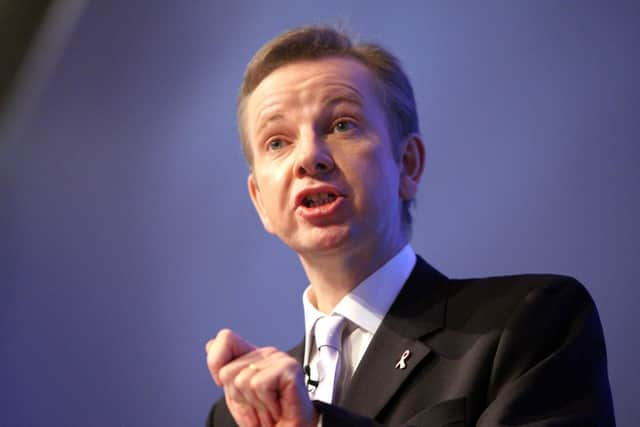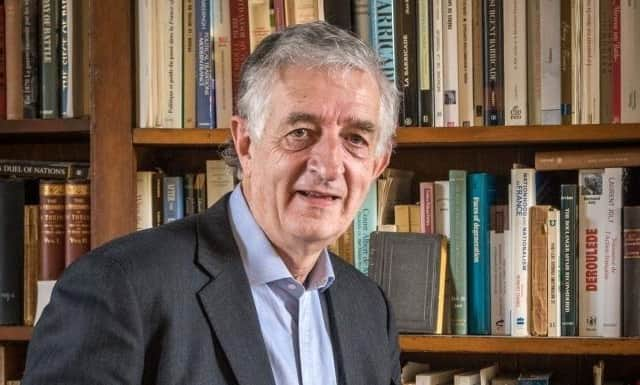Belfast Agreement @25: Why as an advisor to David Trimble I opposed the deal and still think it a mistake, writes Graham Gudgin


After an unappealing week of self-congratulation by the proponents of the Good Friday Agreement (plus Ursula von der Leyen who just wanted in on the party) one feels like the child in Hans Christian Anderson’s fairytale The Emperor’s New Clothes. Except that in this case the child would have been told to go away and keep quiet.
In his 56-page demolition of the case for the Good Friday Agreement (GFA) written in 2000, Michael Gove, then assistant editor of the Times wrote that “criticism of the NI peace process has become the closest thing in our secular society to blasphemy”. This has remained true ever since. I know from personal experience in Cambridge that many academics view it as unthinkable to criticise the GFA and do not feel that the failure of GFA institutions to operate 40% of the time is any significant blemish on an agreement which to them has almost biblical intrinsic merit. To Nancy Pelosi it is ‘a beacon of hope to the world’.
Advertisement
Hide AdAdvertisement
Hide AdGove regarded the 1998 referendum as ‘rigged’ with all of the power of the state and civil society on one side. Subsequent debate is similarly unbalanced. In last week’s BBC radio ‘Reunion’ retrospective on the build-up to the GFA, there was room for the tiny Women’s Coalition but no opponents of the agreement were invited to take part despite nearly 30% of voters opposing the agreement in the 1998 referendum. The 25th anniversary celebrations at the two universities in Belfast notably avoided invitations to those who may have opened a debate.


Gove felt strongly that successful policy emerges not from quasi-religious certainties but from argument and opposition. Democracy he argued depends on opposition. “The energy with which this government has sought to insulate its NI policy from criticism should give any democrat cause to worry.” Opponents of the GFA are “held guilty of opposing peace” he wrote. “Surely what ministers thinks of as peace can be bought at too high a price. If it were not for those who opposed appeasement in the 1930s who would have rescued the nation from folly.”
Gove viewed the GFA as an act of appeasement and a moral failure of government. I agreed at the time and voted against the GFA in 1998 along with, to the best of my knowledge, all of David Trimble’s special advisors during my time at Stormont. I still feel strongly that the GFA was a mistake. The debate is being reopened because significant number of thoughtful and well-meaning unionists who voted for the agreement in 1998 now bitterly regret doing so. It also important to remember that while support for the GFA in 1998 was almost universal on the nationalist side, it is estimated that only a narrow majority of unionists voted for the agreement. The polling evidence today is that current supporters of the GFA are a distinct minority among unionists.
Michael Gove presciently foresaw that the GFA was vastly more than a simple armistice which ended 30 years of violence. It was liberal blueprint for a new world not just for NI but for the whole UK and further afield.
Advertisement
Hide AdAdvertisement
Hide AdGove wrote that “It enshrines a vision of human rights which privileges contending minorities at the expense of the democratic majority. It supplants the notion of independent citizens with one of competing client groups. It offers social and economic rights, ‘positive rights’ which legitimize a growing role for bureaucratic agencies in redistributing resources, the running of companies, the regulation of civic life and exercise of personal choice. It turns the police force into a political plaything whose legitimacy depends on familiarity with fashionable social theories and precise ethnic composition and not effectiveness in maintaining order. It uproots justice from its traditions and makes it politically contentious. It demeans traditional expressions of British national identity. And it privileges those who wish to refashion of deconstruct that identity.”


No wonder that Irish nationalists, and what Professor Matthew Goodwin now calls the liberal elite, venerate the agreement. As Brendan O’Neill argues, the human rights elements of the GFA now prevent the UK from leaving the European Convention of Human Rights in order to deal with the problem of illegal migration across the English Channel.
My own objections to the agreement were, and are, firstly that its unique and frankly bizarre system of involuntary coalitions with four or more parties in government with contrasting policies, some devoted to the destruction of Northern Ireland, was clearly never going to work. It required a blocking mechanism to stop extreme policies, and these resulted not in changes of government as in normal democracies but no government at all for years on end. The system was designed to get paramilitary representatives not only into the assembly but also into government itself. This worked on the nationalist side because enough Catholics sided with IRA representatives, but not on the unionist side because only a tiny proportion of Protestants were willing to vote for the representatives of loyalist paramilitaries. A system of voluntary coalitions would have been more democratic. The complex panoply of cross-border bodies was included, not for practical purposes but as a step towards Irish unity. These were then used in the so-called ‘mapping exercise’ to argue the need for a border in the Irish Sea after Brexit.
Secondly, it was not a final settlement of the status of Northern Ireland which the IRA had fought so hard to overturn. US envoy Richard Haass praises the lack of finality as realpolitik essential to pragmatic peacemaking, establishing not a settlement but ground-rules for changes in sovereignty. What this did in practice was throw the ball of sovereignty into the air to be contested forever in a way which was bound to poison Northern Ireland politics and to continue its ungovernability. It emphasised, but did not introduce, the idea that individual identity could be British or Irish (which had always been true) in way which suggested that sovereignty was fluid. It introduced an undertaking that if 50% plus one of voters in NI (on however small a turnout) voted for Irish unity then NI would become part of the Irish Republic with no way back. A million NI unionists would be deprived for their lifelong British citizenship without any of them voting for such an outcome. Thoughtful southerners realise that this is dangerous nonsense, but when Leo Varadkar suggested this was inadvisable in 2022, he was immediately reined in and reminded that his view contradicted the sacred GFA.
Advertisement
Hide AdAdvertisement
Hide AdThe alternative would have been for the British government to assert that Northern Ireland was inalienable British territory due to the presence of a million people of British descent and identity who were never likely to peaceably accept unwillingly being absorbed into the Irish Republic. In this sense NI is unlike Scotland where the likelihood is that Scots of all persuasions are likely to accept the result of a referendum which separated Scotland from the rest of the UK. In Northern Ireland, Irish unity imposed on unwilling unionists is likely to lead to civil war as Leo Varadkar realised.
A response to the counter-charge that many Irish nationalists unwillingly live in NI as part of the UK without their consent, should be to offer a degree of repartition to maximise the number of residents living in their preferred country. This would complete the unfinished business of the 1925 Boundary Commission and recognize that Northern Ireland was founded with too large a territory and included too many nationalists. The complex residential mosaic of nationalists and unionists of course makes any completely satisfactory repartition impossible, but significant adjustments are possible. The deeper problem is that nationalists would reject discussing any final solution that does not deliver the whole of the territory into their hands. An offer would at least reveal nationalist intransigence.
As an armistice the GFA did do the job of largely stopping the killing and bombing. Killings had been running at around one a week in the decade before 1998 and were numerically less than half the level for Northern Ireland’s road deaths. This was the case even for the decade preceding the 1990s ceasefires. The Northern Ireland economy had for a decade before 1998 been growing well, expanding faster than it has since the agreement. The UK government could have taken the same view as the Spanish did with ETA and insisted on an unconditional surrender of the IRA. Some level of killings, maiming and destruction would have continued, perhaps for several years, but with the IRA heavily penetrated and the radical shift in attitudes to terrorism after the fall in the Soviet Union and even more after 9/11 in New York, Gove took the, surely reasonable, view that the end was in sight for IRA violence.
As it was, negotiations took place at the barrel of a gun. The republican threat was that if they failed to get satisfactory terms, the IRA would kill more people. Indeed, they had already bombed Canary Wharf in 1996, killing two people including a Pakistani newsagent, to persuade John Major to drop his demand for prior decommissioning of weapons before talks could start. Talks did later start without decommissioning. Moreover, the demand for decommissioning was then fudged in the GFA itself, and this delayed the operation of the assembly for a year under the insistence of David Trimble’s UUP that democracy could not work with the presence of armed parties.
Advertisement
Hide AdAdvertisement
Hide AdFar from being a glorious example to the world of peace and reconciliation, the GFA was an unnecessary exercise in appeasement. Nonetheless, people in Ireland, Britain and across Europe were intensely grateful that the embarrassing sight of a civil war in modern Europe had come to an end. As such they would have, and did, accept almost any terms and thought little about effective administration, the long-term consequences for stability, or indeed the morality of what was done. What has been done is to whitewash the reputation of Sinn Fein and the IRA. A majority of nationalists now believe that the 30-year republican war was justified. They are fed lies about the nature and scale of supposed discrimination under unionist administrations before 1971 and Sinn Fein now have an elected first minister in Belfast and may soon achieve the same in Dublin. Violence has been shown to pay off.
Even a British Secretary of State last week hailed former IRA leaders as peacemakers who showed courage and leadership. Just as the celebration of 1916 insurgents in the South encouraged the provisional IRA to pursue Irish unity by violence in the 1940s, 1950s and from 1969., the whitewashing of violence via the GFA runs the risk of something similar in future. Even the apparent GFA guarantee of no Irish unity without majority consent looks fragile as the Windsor Framework makes it clear that British sovereignty can be whittled away without democratic consent in NI. Only the very last step now appears to be subject to a vote.
Many unionists take the view that successive British governments are at best careless about the prospect of Irish unity. At worst many agree with Michael Gove in 2000 that British governments actively connive at achieving Irish unity. I do not believe this. The huge financial cost and military effort of maintaining the Union do not suggest a lack of will. The intention has rather been to make Northern Ireland a place where nationalists and republicans can feel at ease in order to both prevent violence and secure Catholic acceptance of the Union. This essentially what Tony Blair promised in his Balmoral speech in May 1998.
To an extent this has worked, with the respected ARINS and NILT polls showing a large minority of Catholics preferring NI to remain part of the UK even after Brexit. The problem is that British benevolence towards Irish nationalists in Northern Ireland is not balanced by a clear determination to maintain the Union in at least some form. Retreat has become continuous. The commitment to a border poll with its unrealistic 50% plus one nature sits uneasily with the demographics in which a higher Catholic birthrate presents a prospect, albeit distant, of Irish unity without a single unionist being persuaded. Unionists are almost daily bombarded with arguments for Irish unity in conferences, conventions, articles and broadcasts.
Advertisement
Hide AdAdvertisement
Hide AdMany are distinctly uneasy. Far from bringing reconciliation between the two main traditions, the GFA keeps the political temperature high, which explains why 116 peace walls are now in place and paramilitary organisations remain in being. Northern Ireland remains within the UK but in what Brendan O’Neill calls ‘a limbo land of post-sovereign purgatory’, with the UK appearing to many unionists ‘more like a caretaker than a sovereign power’. This is no recipe for stability.
• Dr Graham Gudgin was special advisor to First Minister David Trimble 1998-2002